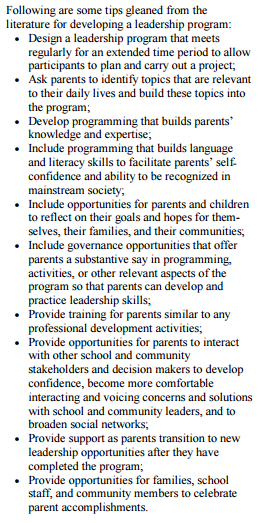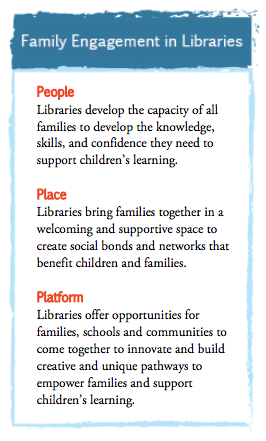Like Han and Love, Toso and Grinder identify parent leadership in schools as especially beneficial to children’s educational outcomes, arguing that family literacy programming in particular is “an ideal venue to develop and offer parent leadership opportunities (Toso & Grinder, 2016, p. 1). Their report is meant to offer administrators and coordinators of family literacy programs best practices to use when incorporating parent leadership in their programs.
Lopez, Caspe and McWilliams, in their report, suggest that public libraries are also ideal venues to foster family engagement. Furthermore, they argue that public libraries can serve to promote equity more generally, by offering programs that diminish opportunity gaps between high and low income families:
“Families with high incomes spend nearly seven times more money on out-of-school enrichment activities—such as music lessons, summer camps, and travel—than families from low-income homes. The opportunities for success for low-income children are diminished. Libraries are free, trusted, safe, and welcoming places in virtually every community that can help counterbalance these inequalities (Lopez, Caspe, & McWilliams, 2016, p. 1).
Toso and Grinder’s ideas surrounding parent involvement are highly grassroots-oriented. They criticize superficial, tokenizing involvement opportunities and instead emphasize the need for involvement activities to “reflect the diversity within the school population since race, socio-economic status, and culture shape how parents participate in their children’s education and schools (Auerbach, 2012a as cited in Toso and Grinder, 2016, p. 1). Aiming for “parent leadership” as opposed to merely “parent involvement,” argue Toso and Grinder (2016), allows parents to have a more influential, meaningful and equal role in their children’s education (p. 2). To truly involve parents in leadership, according to Toso and Grinder, is:
- “ To engage parents in collaborative and involved decision making in schools or other governance structures;
- To build parent knowledge and understanding of systems, institutional structures, and the accompanying power relationships; and
- To develop advocacy skills” (Toso & Grinder, 2016, p. 2).
Moreover, for best results, Toso & Grinder (2016) suggest that parent engagement programs should strive to include “literacy content knowledge and leadership” to “assist parents and their children to be successful in-school and out-of-school settings (p. 3). This is to say that parent leadership alone is not enough—literacy skills are essential for sustained and effective parent involvement. Practical tips for developing this sort of leadership program are in Figure 1.
Though Lopez, Caspe and McWilliams focus less on parent leadership specifically, and instead on family engagement more generally, they do note the significant community-building benefits that libraries have. Some reasons for this can be seen in Figure 2. What’s more, “the rich digital and hands-on resources offered in libraries—especially when guided by librarians—can prompt parents and caregivers to steer children’s learning, ask questions, make connections, and exchange information with each other (Lopez, Caspe, & McWilliams, 2016, p. 6). Ultimately, these community connections can lead to opportunities for advocacy and organizing. Like Toso and Grinder, Lopez, Caspe and McWilliams (2016) also promote a highly-grassroots method for parent engagement, noting that “lower-income families and communities of color are also more likely than other groups to turn to libraries for training, job searches, and services for immigrants or first-generation Americans “(p. 6). Thus, as these families engage and begin to organize, their programs will likely seek to serve their own community.
References:
Lopez, M. E., Caspe, M., & McWilliams, L. (2016). Public Libraries: A Vital Space for Family Engagement (pp. 1-19). Retrieved May 15, 2017, from Harvard Family Research Project & Public Library Association website: http://www.ala.org/pla/sites/ala.org.pla/files/content/initiatives/familyengagement/Public-Libraries-A-Vital-Space-for-Family-Engagement_HFRP-PLA_August-2-2016.pdf
Toso, B. W., & Grinder, E. L. (2016, May). Practitioner’s Guide #6: Parent Engagement and Leadership Opportunities: The Benefits for Parents, Children, and Educators (pp. 1-8). Retrieved May 15, 2017, from Goodling Institute for Research in Family Literacy website: https://ed.psu.edu/goodling-institute/professional-development/practitioners-guide-6


